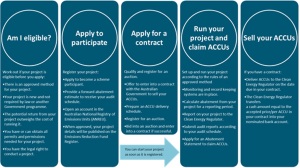ERF: 8 week registration deadline for existing abatement projects
One of the key features of the Emissions Reduction Fund is that projects need to be “new” at the time of registration.
From July 1st, only “paper projects” (projects in concept phase up to and including a completed design but without a formal decision to go ahead) will be allowed to participate.
That is, if your organisation is planning a project that would yield carbon benefits (such as a landfill gas flare), you can only:
- Make an investment decision subject to a condition that the project should first be registered as an Emissions Reduction Fund project;
- Conduct a feasibility study;
- Plan or design the project;
- Obtain regulatory approvals and consents; and
- Obtain advice or conduct negotiations.
But will be ruled ineligible if you:
- Make a “final investment decision”;
- Acquire or lease a tangible asset (other than land or a minor asset); and
- Commence construction work.
Figure 1 ERF participation process from 1 July 2015
HOWEVER
If your project has already started, you can apply before 1 July 2015 and automatically become a transitional ERF applicant.
Your project application will be assessed under the rules of the Emissions Reduction Fund, with some adjustments:
- Projects do not need to be new;
- Projects can be backdated in line with the rules allowed by the Carbon Farming Initiative method you have chosen to use; and
- If you are a Recognised Offsets Entity under the Carbon Farming Initiative, that ‘fit and proper person test’ will satisfy the Emissions Reduction Fund entry requirements.
What happens after 1 July 2015?
If you have already started an activity and have not submitted an application for a project, you won’t be able to participate in the Emissions Reduction Fund. This is because your project would not be considered new.
With only 8 weeks until July 1st, now is the time to register your:
- Capture and combustion of methane in landfill gas from legacy waste;
- Avoided Emissions from Diverting Legacy Waste from Landfill for Process Engineered Fuel Manufacture;
- Avoided Emissions from Diverting Legacy Waste from Landfill through a Composting Alternative Waste Technology;
- Diversion of Legacy Waste to an Alternative Waste Treatment Facility; and
- Enclosed Mechanical Processing and Composting Alternative Waste Treatment.
Or for others in the land sector:
- Destruction of methane generated from manure in piggeries;
- Reducing greenhouse gas emissions by feeding nitrates to beef cattle or additives to milking cows;
- Sequestering carbon in soil in grazing systems;
- Reducing greenhouse gas emissions through early dry season savanna burning;
- Native forest protection (avoided deforestation); and
- Reforestation and Afforestation.
MRA is one of Australia’s Leading Environmental Consulting firms, specialising in all aspects of business and policy reform. We are experts in waste, resource recovery and technology, climate change, carbon and sustainable development, and our vision of the future is one that is both environmentally sustainable and economically rational.
If you would like further information, please contact Jordon Wong or Julien Gastaldi on 0479 043 903.




